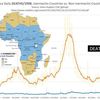Það er nóg til
15.2.2014 | 12:17
Það er nóg til,
ef þú leitar lausna.
endurtekið
Hér er ég að hugsa um að láta þig lesa greinina
og endursegja svo efnið í örfáum orðum
sem gætu aukið skilning okkar
sem eru aðeins tregari.
Hér eru Socialistar að reyna að skilja
að góðar lausnir eru til,
aðeins að nota andan, hugsa, leita lausna.
Það er algjör óþarfi að fækka fólkinu um nokkra miljarða.
http://www.ipegateway.com/?p=364
http://www.isj.org.uk/index.php4?id=671&issue=127 <---- thiss one fails
if some address fails use google.com to find it, for example: Dispelling “the Malthus myth”
Dispelling “the Malthus myth”
In the 200 years since the Reverend Thomas Malthus first penned his tract An Essay on the Principle of Population the question of the “carrying capacity” of the planet has repeatedly appeared. Most recently, mainstream debates around how to solve the question of climate change have boiled down to the simplistic argument that “there are too many people”.
“The idea that a growing population means a greater pressure on natural resources, which eventually exceeds planetary capacity, is a simple common sense one. It is also wrong. Since Malthus’s time, those who have followed in his footsteps have used such arguments to justify the world’s unequal distribution of wealth and argue against the possibility of social reform.”
oooo
Niðurstöður fyrir maltus
5 bloggfærslur fundust
Buckminster R Fuller, Synergy, Maltus.
Jónas Gunnlaugsson | 3. maí 2012
Buckminster R Fuller, Synergy , Maltus . http://www.herad.is/y04/1/2012-04-22-You-should-read-Buckminster-04.htm You the inteligent people of the world should read Buckminster R. Fuller and teach us , in few easy to understand words . ***** Synergy View
oooo
USA, sýna athygli, vera viðbúinn
Jónas Gunnlaugsson | 5. apríl 2013
USA Hver er að ginna USA til að færa varnarmátt og athygli til Austur Asíu. Hvar er veikur punktur hjá þér USA? Athyglin þarf að vera algild. Einhver sagði nálægt Austur Tímor, ekki veit ég það. Kemur ógnin úr óvæntri átt? Það er engin nauðsyn að fækka
oooo
Verum fulltrúar gnægta, lausna.
Jónas Gunnlaugsson | 21. apríl 2013
Verum fulltrúar gnægta, lausna. Do more with less Buckminster R Fuller Hlustaði á Silfur Egils að hluta í dag. Þar var talað um “hin miklu vandræði”,takmörk (hag) vaxtarins, Þá varð mér hugsað til “hinna miklu vandræða” um
Oooo
http://www.ipegateway.com/?p=364
http://www.isj.org.uk/index.php4?id=671&issue=127
Dispelling “the Malthus myth”
Issue: 127
Posted: 25 June 10
Martin Empson
Fred Pearce, Peoplequake: Mass Migration, Ageing Nations and the Coming Population Crash (Eden Project Books, 2010), £12.99
In the 200 years since the Reverend Thomas Malthus first penned his tract An Essay on the Principle of Population the question of the “carrying capacity” of the planet has repeatedly appeared. Most recently, mainstream debates around how to solve the question of climate change have boiled down to the simplistic argument that “there are too many people”. James Lovelock for instance argues “that we are treating the planet so badly that we are likely to require a population crash to about one billion people before the world can again live within its ecological means”. The Optimum Population Trust, who “support research into lower optimum population sizes” and “campaign for a lower population in the UK”, claim that “human consumption of renewable resources is already overshooting Earth’s capacity to provide”.
This argument fits perfectly with Malthus’s own beliefs. It would have been recognised by writers such as Paul Ehrlich who spent the 1960s warning the world that its rapidly growing population would soon exceed the planet’s ability to provide. It is a recipe that ends up blaming the poorest people for the world’s problems.
The idea that a growing population means a greater pressure on natural resources, which eventually exceeds planetary capacity, is a simple common sense one. It is also wrong. Since Malthus’s time, those who have followed in his footsteps have used such arguments to justify the world’s unequal distribution of wealth and argue against the possibility of social reform. Racism and scapegoating have flowed from the theory and have lead to forced sterilisation programmes, abortion and anti-immigrant legislation. The resurgence of these debates in the context of environmental crisis is a distraction from discussions about the political and economic changes required to tackle global warming.
It is in this context that Fred Pearce’s latest book is such an important contribution. Pearce turns just about every perceived wisdom about population on its head. From the publication of his first writings, Malthus’ ideas rapidly made it into the mainstream. Eugenicists tacked on their ideas of racial superiority to Malthusian concerns and the resultant poisonous mix made the perfect ideology to justify colonialism and empire. Malthus himself had become the first professor of political economy, teaching a generation of future administrators of empire about the “perils of overpopulation” and the “pointlessness of charity”. Charles Trevelyan, who oversaw the Irish Potato famine for the British government, was a student of Malthus.
The same ideas were at the back of Winston Churchill’s mind when he called for the sterilisation of the “feeble-minded”. Between the First and Second World Wars “60,000 imbeciles, epileptics and ‘feeble-minded’ were compulsorily sterilised in the US”, there were tens of thousands of further victims in countries as diverse as Sweden and Japan. The logic was taken to its brutal extreme by the Nazis, who sterilised half a million people, though as Pearce points out, their policies were “widely admired”.
In the post war period, Malthusian ideas were very much part of the ruling ideology of the Cold War. In the early 1950s, the Rockefeller Foundation was set up to ensure that industrial development was held back from countries like India until they had dealt with their population problem. Senior figures in United Nations organisations and Western governments believed that aid shouldn’t be given to “overpopulated” countries, such as Japan, until they had reduced the numbers living there.
But for leading figures in the US administration at this time, concerns about overpopulation were not driven by a desire to improve the lives of the world’s poorest. Rather they saw the issue as a strategic threat to US dominance. One government report concluded that “hungry people without enough land to grow food were likely to be seduced by dreams of land reform”. Such dreams could lead to revolution, and something had to be done. In addition to the introduction of population control programmes, groups like the Rockefeller Foundation funded research into crop improvements—the “green revolution”.
One of the problems for Malthus’s followers, is that time and again their predictions haven’t come true. Today’s population of Britain is far in excess of what was possible, according to Malthus. Billions of people did not starve to death in the developing world as Ehrlich had promised in the 1970s. The simple reason for this is the development of new and improved ways of producing food. The introduction of improved varieties of wheat, rice and maize massively increased the amount of food that was grown. In the “30 years from 1963, food output outstripped population growth by 36 percent in Asia as a whole”, writes Pearce. “In this light”, he continues, “the green revolution and population control were both part of a fix to preserve the capitalist status quo”.
Changes in farming brought other consequences—the risks of relying on a few crop varieties, the environmental problems caused by increased use of water as well as the consequences of over-reliance on pesticides. The green revolution hasn’t led to an end to hunger—though
millions of people who might have starved to death can get food to eat. As Pearce points out, those who starve today do so because they can’t afford to eat, rather than a shortage of food.
But for Pearce there is another unintended consequence. Because the green revolution allowed greater crop yields, less people were needed to farm the land. This led to smaller families and falling fertility levels in Asia. Pearce argues that falling fertility and crashing population are likely to be the real population problem for the 21st century. In many parts of Europe we are already experiencing a major population crisis. If fertility rates stay the same in countries like Italy and German native populations will fall by over 80 percent by the end of the century. Currently Europe is producing about 6 million babies a year. That’s 2 million less than needed to maintain the population. The population of Russia is dropping by half a million every year.
Increasingly, richer countries will be relying on immigration from the developing world to keep society running. But the developing world is also having fewer children. On current trends, world population is likely to start falling within a generation for the first time since the Black Death. The reasons for this are complex. Pearce highlights a number of factors—improved access to contraception, for instance. He also notes how, when access to education improves, women tend to have fewer children. But he also makes the point that when there is access to decent healthcare and childcare, women are able to make the decision to have children.
An ageing, shrinking population brings its own problems. Already in France and Japan there are only two taxpaying workers to support each pensioner. In Italy the figure is as low as 1.3. Many economies will increasingly rely on migrants to work, flying in the face of the anti-immigrant rhetoric we currently are experiencing. But the conclusion that Pearce comes to is a positive one. Although from an environmental point of view, he doesn’t believe we should stop worrying. Population is not the key factor in environmental destruction. What is important is the distribution of wealth.
“The poorest three billion or so people on the planet (roughly 45 percent in total) are currently responsible for only 7 percent of emissions, while the richest 7 percent (about half a billion people) are responsible for 50 percent of emissions.” Thus an increase in the population of the poorest areas of the world, despite what we are told by some environmentalists, will make little impact on climate change. The big question is how we change society in the richer world.
Fredrick Engels summed up Malthus’s ideas simply: “The earth is perennially overpopulated, whence poverty, misery, distress and immorality must prevail; that it is the lot, the eternal destiny of mankind, to exist in too great numbers, and therefore in diverse classes, of which some are rich, educated, and moral, and others more or less poor, distressed, ignorant and immoral.”
For Marx and Engels, arguments of overpopulation hid a wider issue. They were a fig leaf covering racist ideas that justified the way that the world was. Today questions of population are still distorted by myths and lies. And they still serve to hide from us the wider question of how we must transform our own societies to save the planet and its people. It is for these reasons that Fred Pearce has done socialists engaged in the environmental movement, as well as those defending migrants and fighting racism, a tremendous service with this book.








Bæta við athugasemd [Innskráning]
Ekki er lengur hægt að skrifa athugasemdir við færsluna, þar sem tímamörk á athugasemdir eru liðin.